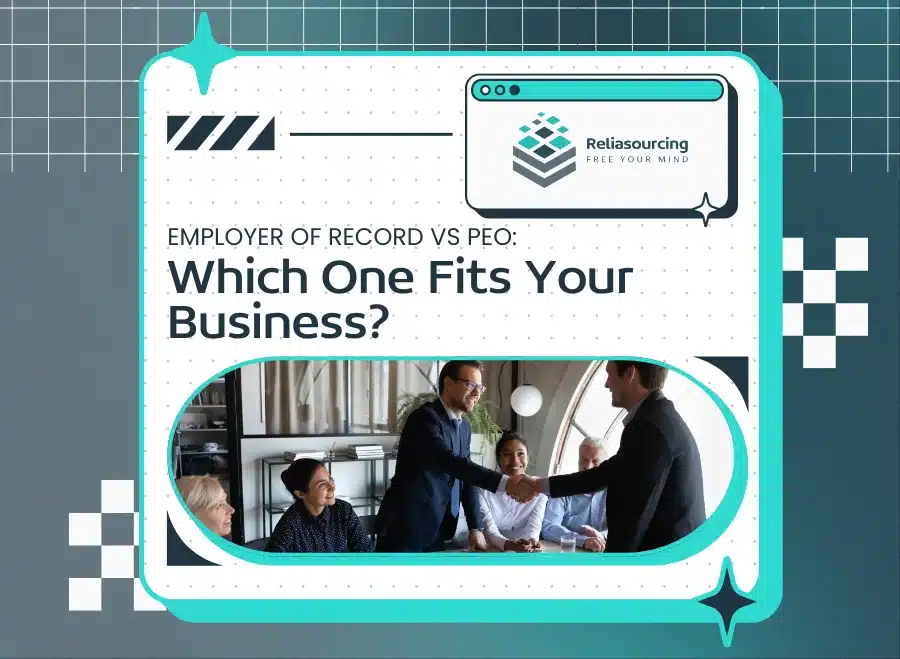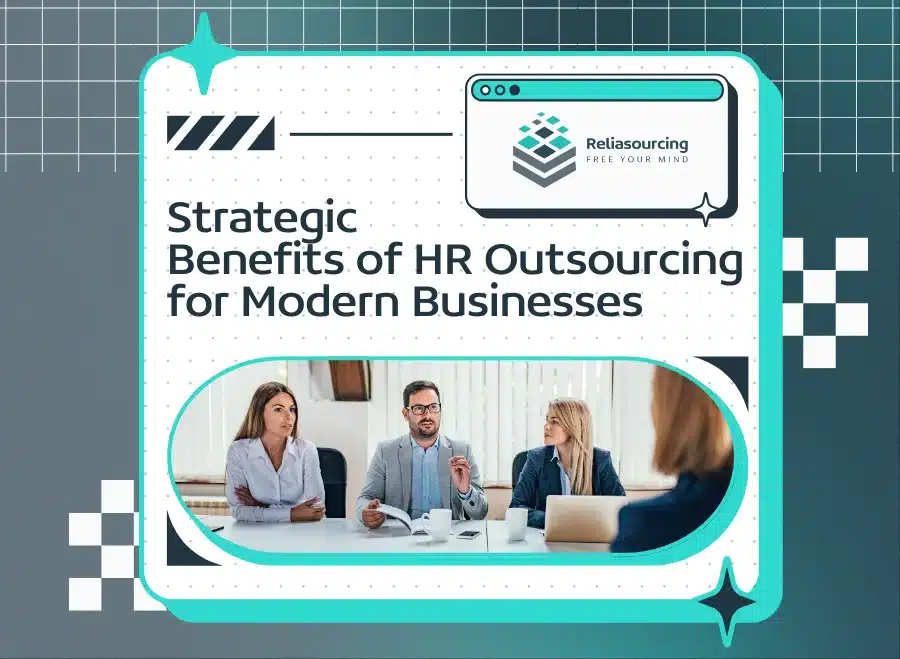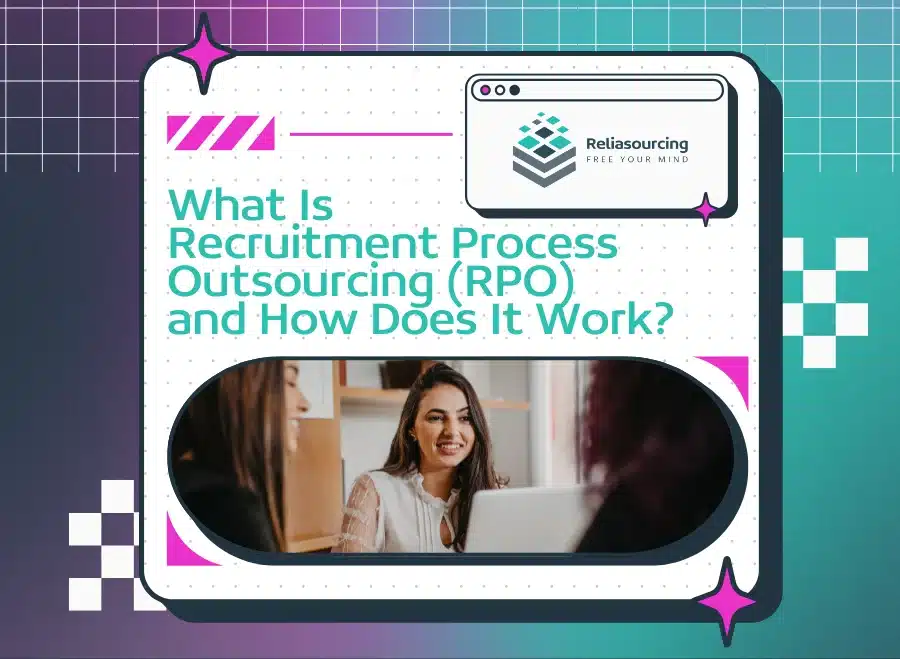Expanding into new markets is a defining moment for any business leader. But hiring employees abroad requires knowing how to navigate local laws, payroll systems, and compliance requirements. Many organizations exploring global growth encounter two key solutions: the Employer of Record (EOR) and the Professional Employer Organization (PEO).
Both models help reduce administrative burdens but differ significantly in scope, responsibilities, and flexibility. Understanding these differences is essential before choosing which model aligns with your company’s expansion strategy.
In this article, we’ll break down how each model works, highlight their key distinctions, and explain why more companies are turning to EORs for fast, compliant, and scalable international hiring. You’ll also learn how Reliasourcing’s flexible approach can help your business grow without the limits of traditional models.
What Is an Employer of Record (EOR)?
An Employer of Record (EOR) is a third-party organization that becomes the legal employer of your workforce in another country. While you manage the employees’ day-to-day tasks, the EOR handles everything related to compliance and employment.
Key responsibilities of an EOR include:
- Hiring employees in full compliance with local labor laws.
- Managing payroll, tax withholdings, and benefits administration.
- Handling employment contracts, terminations, and HR compliance.
The EOR model is especially effective for businesses looking to hire abroad without setting up a local entity. Instead of navigating complex legal requirements country by country, companies can rely on an EOR to streamline global hiring.
What Is a Professional Employer Organization (PEO)?
A Professional Employer Organization operates under a co-employment model, meaning the business and the PEO share employer responsibilities. While the PEO manages HR functions such as payroll, benefits, and compliance, the company must already have a legal entity in the country where employees are hired.
Typical PEO responsibilities include:
- Administering payroll and benefits.
- Supporting HR compliance and employee relations.
- Sharing liability with the client company as a co-employer.
The PEO model works well for companies that want HR and compliance support within markets that already operate legally. However, it’s less effective for businesses seeking rapid expansion into new countries.
Key Differences Between EOR and PEO
While both models provide HR and compliance support, they differ in structure, requirements, and flexibility. Here’s a side-by-side look:
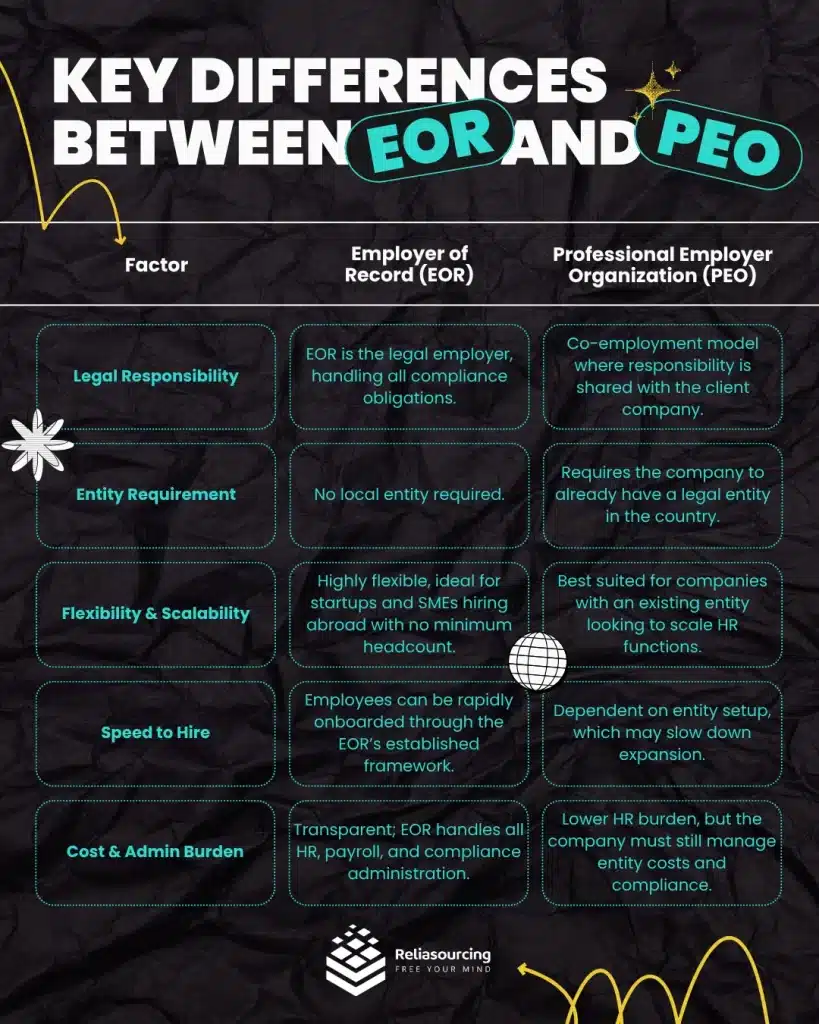
While both models reduce administrative overhead, it’s vital to understand the risks of outsourcing, especially in areas like legal compliance, data privacy, and worker classification.
How Reliasourcing Delivers Employer of Record Services
Reliasourcing’s Employer of Record services are designed for businesses that want speed, flexibility, and compliance without unnecessary barriers. Unlike many providers focusing solely on compliance, Reliasourcing emphasizes scalability, helping companies grow without minimum headcount requirements.
Here’s how Reliasourcing stands out:
- Compliance-first approach. Payroll, benefits, and HR administration are fully aligned with local labor laws.
- Tailored solutions. If you’re a startup hiring your first overseas employee or a multinational expanding into new regions, Reliasourcing adapts to your needs.
- Scalability without limits. Unlike many providers, Reliasourcing does not impose minimum headcount requirements, making it a perfect fit for growing companies.
- Local expertise. With operations based in the Philippines, Reliasourcing offers businesses access to one of the world’s strongest outsourcing hubs.
Reliasourcing removes the uncertainty of global hiring, allowing leaders to focus on strategy and growth instead of red tape. Discover how our EOR solutions simplify global hiring.
Conclusion: Making EOR Part of Your Growth Strategy
When it comes to Employer of Record vs PEO, the right choice depends on your business model and expansion plans. A PEO may suffice if you already have a local entity and want HR support. Still, if your goal is to hire employees abroad quickly, compliantly, and without costly entity setup, an EOR is the smarter solution.
Many organizations explore EOR partnerships for the same reasons companies outsource work: efficiency, flexibility, and access to specialized expertise without the burden of establishing local entities.
Reliasourcing’s Employer of Record services give businesses the confidence to expand globally, without minimum headcount requirements and with full compliance support. If you’re a startup or an established company, the flexibility of EOR enables you to explore new markets and scale at your own pace.
Ready to simplify global hiring? Contact Reliasourcing today and discover how our EOR solutions can power your next phase of growth.

